2019最新中考英语专题讲练一般将来时(解析版)
最新中考初中英语主要时态系列讲座(三)----一般将来时与过去将来时精讲及练习(含答案)
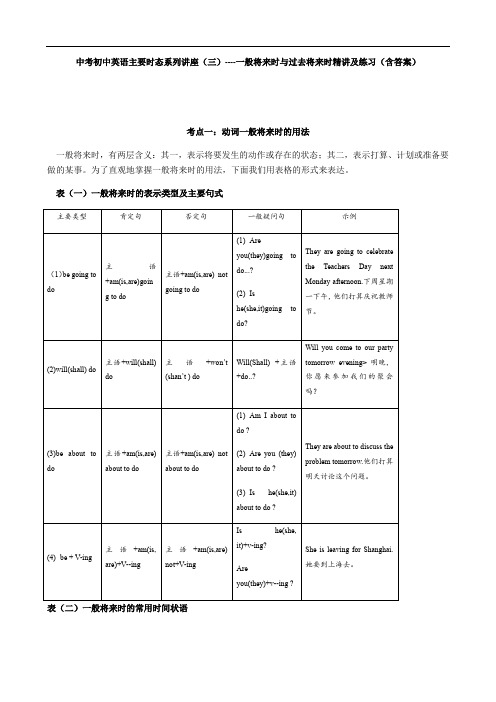
中考初中英语主要时态系列讲座(三)----一般将来时与过去将来时精讲及练习(含答案)考点一:动词一般将来时的用法一般将来时,有两层含义:其一,表示将要发生的动作或存在的状态;其二,表示打算、计划或准备要做的某事。
为了直观地掌握一般将来时的用法,下面我们用表格的形式来表达。
表(一)一般将来时的表示类型及主要句式表(二)一般将来时的常用时间状语表Array(三)一般将来时的主要用法【典型考例1】(2019天津)---What is your plan for next weekend,Lingling?----I volunteer work in the museum.A. was doingB. didC. have doneD. am going to do【析】正确答案D。
句意是:玲玲,下周末的安排是什么?我打算到博物馆去作志愿者。
根据上文的next weekend(下周末)可知,玲玲的回答是指下周的打算,所以用一般将来时,因此,正确答案为D。
【典型考例】(2019四川内江)---Have you watched the new movie,Joe?---No,I________ it with my sister this evening.A.watch B.are watching C.watched D.will watch【析】正确答案:D。
句意是:乔,你看了这部新电影吗?没有。
我今晚将和我妹妹一起去看。
根据本句末的时间状语this evening可知,看新电影这动作是将来要做的事情,因此动词使用一般将来时。
所以,正确答案为D。
【典型考例】(2019天津)----Could you tell me for the fruit?----By paying over the Internet.A. how much will I payB. how much I will payC. how will I payD. how I will pay【析】正确答案D。
中考英语动词时态精练解析版--一般将来时
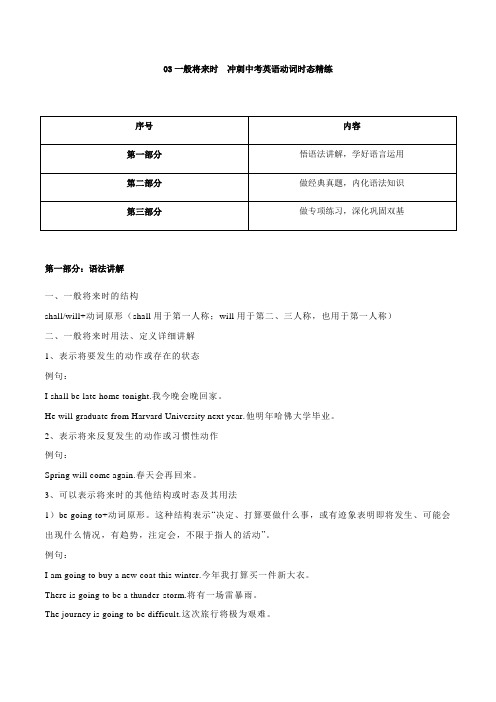
03一般将来时冲刺中考英语动词时态精练第一部分:语法讲解一、一般将来时的结构shall/will+动词原形(shall用于第一人称;will用于第二、三人称,也用于第一人称)二、一般将来时用法、定义详细讲解1、表示将要发生的动作或存在的状态例句:I shall be late home tonight.我今晚会晚回家。
He will graduate from Harvard University next year.他明年哈佛大学毕业。
2、表示将来反复发生的动作或习惯性动作例句:Spring will come again.春天会再回来。
3、可以表示将来时的其他结构或时态及其用法1)be going to+动词原形。
这种结构表示“决定、打算要做什么事,或有迹象表明即将发生、可能会出现什么情况,有趋势,注定会,不限于指人的活动”。
例句:I am going to buy a new coat this winter.今年我打算买一件新大衣。
There is going to be a thunder-storm.将有一场雷暴雨。
The journey is going to be difficult.这次旅行将极为艰难。
2)be going to和will等的比较。
①will表示说话人认为、相信、希望或假定要发生的事,不含任何具体时间,可以指遥远的将来。
而be going to指有迹象表明某事即将发生或肯定会发生,通常表示很快就要发生的事情。
例句:There is going to be a quarrel between them, I think.看来两人要发生争吵了。
He is going to get better.他的病就要好了。
②be going to和will均可表示“意图”;但事先考虑过的意图用be going to,而不是事先考虑的意图用will。
例句:A: Why have you torn the paper into pieces?B: I am going to rewrite it. (事先考虑的)A: It is a really big stone.B: I will help you to move it. (未经考虑的)3)现在进行时。
中考九年级英语一般将来时知识点总结及经典习题(含答案)
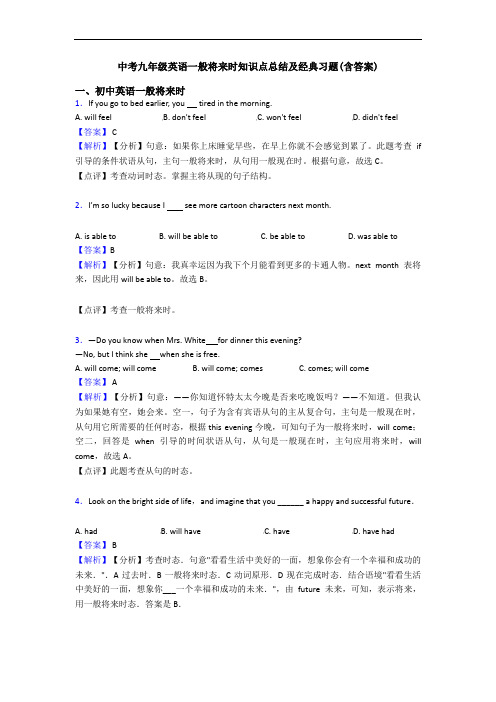
中考九年级英语一般将来时知识点总结及经典习题(含答案)一、初中英语一般将来时1.If you go to bed earlier, you tired in the morning.A. will feelB. don't feelC. won't feelD. didn't feel【答案】 C【解析】【分析】句意:如果你上床睡觉早些,在早上你就不会感觉到累了。
此题考查if 引导的条件状语从句,主句一般将来时,从句用一般现在时。
根据句意,故选C。
【点评】考查动词时态。
掌握主将从现的句子结构。
2.I’m so lucky because I see more cartoon characters next month.A. is able toB. will be able toC. be able toD. was able to【答案】B【解析】【分析】句意:我真幸运因为我下个月能看到更多的卡通人物。
next month表将来,因此用will be able to。
故选B。
【点评】考查一般将来时。
3.—Do you know when Mrs. White for dinner this evening?—No, but I think she when she is free.A. will come; will comeB. will come; comesC. comes; will come【答案】 A【解析】【分析】句意:——你知道怀特太太今晚是否来吃晚饭吗?——不知道。
但我认为如果她有空,她会来。
空一,句子为含有宾语从句的主从复合句,主句是一般现在时,从句用它所需要的任何时态,根据this evening今晚,可知句子为一般将来时,will come;空二,回答是when引导的时间状语从句,从句是一般现在时,主句应用将来时,will come,故选A。
【点评】此题考查从句的时态。
中考英语专题讲练一般将来时(解析版)

A. will be
B. is
C. will
D.
is going
随练 1.2 I _________ the shops. Can I get you anything?
题模精选
题模一:基本用法
例 1.1.1 He is very busy this week, he _________ free next week.
A. will is
B. is
3
C. will
D. will be
例 1.1.2 _________ your brother _________ a magazine from the library? A. Are; will borrow B. Is; going to borrow C. Will; borrows D. Are; going to borrows
1
生某事。
sky. It ’s going to rain. 看天空的黑云。要下雨了。
四、时间状语 1. tomorrow, the day after tomorrow 明天,后天 2. next week/ month/ year 下周 /月 /年 3. in + 时间段(对其提问用 how soon ):in two days 两天后 4. in + 过去时间点: in 2020 在 2020 年 5. soon 不久以后 6. in (the) future 将来、未来
例 1.1.3 If they come, we _________ a meeting.
A. will have
B. have
C. had
D. would have
题模二:句型转换
2019人教八年级上册Unit 7单元语法:will引导的一般将来时精讲精练(word, 包含答案)
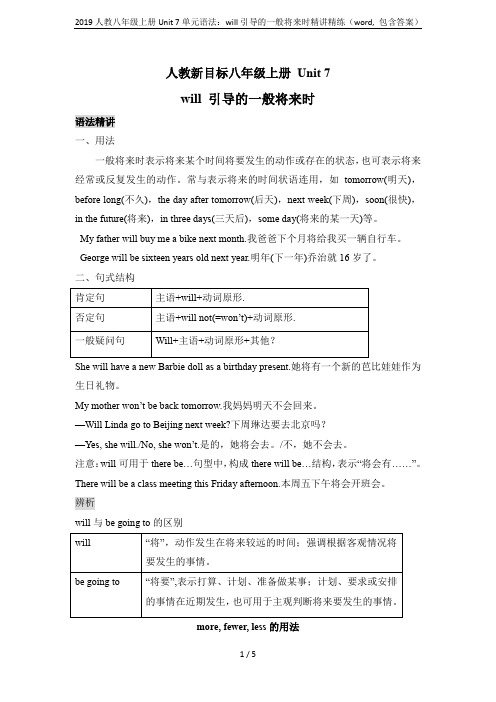
人教新目标八年级上册Unit 7will 引导的一般将来时语法精讲一、用法一般将来时表示将来某个时间将要发生的动作或存在的状态,也可表示将来经常或反复发生的动作。
常与表示将来的时间状语连用,如tomorrow(明天),before long(不久),the day after tomorrow(后天),next week(下周),soon(很快),in the future(将来),in three days(三天后),some day(将来的某一天)等。
My father will buy me a bike next month.我爸爸下个月将给我买一辆自行车。
George will be sixteen years old next year.明年(下一年)乔治就16岁了。
二、句式结构She will have a new Barbie doll as a birthday present.她将有一个新的芭比娃娃作为生日礼物。
My mother won’t be back tomorrow.我妈妈明天不会回来。
—Will Linda go to Beijing next week?下周琳达要去北京吗?—Yes, she will./No, she won’t.是的,她将会去。
/不,她不会去。
注意:will可用于there be…句型中,构成there will be…结构,表示“将会有……”。
There will be a class meeting this Friday afternoon.本周五下午将会开班会。
辨析will与be going to的区别more, fewer, less的用法语法精练一、用所给单词的适当形式填空,使句子或对话完整、通顺。
1. —_____ Tom______ (watch) a soccer game this Saturday?—Maybe. But I’ m not sure about that.2. There_________ (be) a singing competition in our school next Monday.3. — _______ people live________(be) 200 years old?—Yes, they will.4. There _______(be) a book sale in our school next week.5. He________(study) in England in two months.二、单项选择1.—What does he say?—He says there ________ a meeting tomorrow morning.A. isB. hasC. will beD. have2. Michael_________ in a school in Yunnan from February to June next year.A. teachB. taughtC. will teachD. was teaching3. Robots more heavy work for us in the future.A. will doB. didC. have doneD. were doing4. Mr. Smith is busy now. He ___________ to you after work this afternoon, OK?A. talkedB. didn’t talkC. will talkD. won’t talk5. -Maria, what are you doing?-I’m practicing the violin. There ___________an art festival next week at our school.A. will beB. will haveC. wasD. has三、按要求完成下列知子。
中考一般将来时的讲解,专项练习及答案 doc
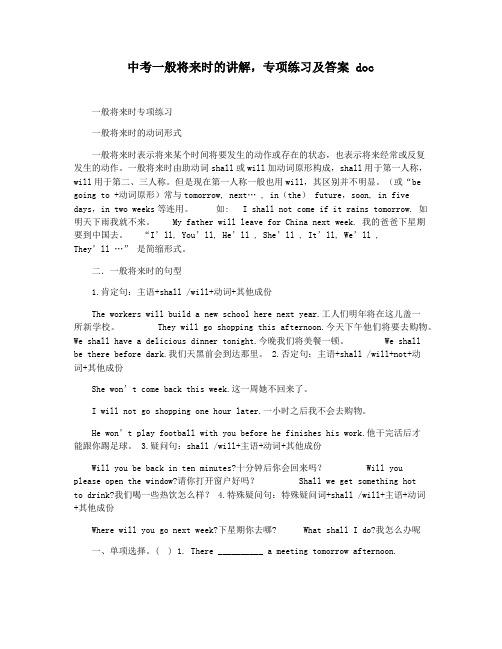
中考一般将来时的讲解,专项练习及答案 doc一般将来时专项练习一般将来时的动词形式一般将来时表示将来某个时间将要发生的动作或存在的状态,也表示将来经常或反复发生的动作。
一般将来时由助动词shall或will加动词原形构成,shall用于第一人称,will用于第二、三人称。
但是现在第一人称一般也用will,其区别并不明显。
(或“be going to +动词原形)常与tomorrow, next… , in(the) future,soon, in five days,in two weeks等连用。
如: I shall not come if it rains tomorrow. 如明天下雨我就不来。
My father will leave for China next week. 我的爸爸下星期要到中国去。
“I’ll, You’ll, He’ll , She’ll , It’ll, We’ll ,They’ll …” 是简缩形式。
二.一般将来时的句型1.肯定句:主语+shall /will+动词+其他成份The workers will build a new school here next year.工人们明年将在这儿盖一所新学校。
They will go shopping this afternoon.今天下午他们将要去购物。
We shall have a delicious dinner tonight.今晚我们将美餐一顿。
We shall be there before dark.我们天黑前会到达那里。
2.否定句:主语+shall /will+not+动词+其他成份She won’t come back this week.这一周她不回来了。
I will not go shopping one hour later.一小时之后我不会去购物。
He won’t play football with you before he finishes his work.他干完活后才能跟你踢足球。
初中英语一般将来时讲解与练习(含答案)
一般将来时讲解与练习一、概念:一般将来时表示将来某个时间要发生的动作或存在的状态,及计划、打算或准备做某事。
常常与表示将来的时间状语连用。
如:tomorrow,next day(week, month, year…),soon,the day after tomorrow(后天)等。
二、常用的表达形式共有五种,现归纳如下:(一)“will +动词原形”这一形式,主要用于在以下几个方面:1、表示单纯的未来“将要”通用于各个人称。
eg:They will go to visit the factory tomorrow. 明天他们将去工厂参观。
I’ll come with Wang Bing and Yang Ling. 我将和王兵、杨玲一起来。
The rain will stop soon. 雨很快就要停了。
2、表示不以人的意志为转移的自然发展的未来的事。
eg:Today is Saturday. Tomorrow will be Sunday. 今天是星期六。
明天是(将)是星期日。
He will be thirty years old this time next year. 明年这个时候他就(将)三十岁。
3、问对方是否愿意做某事或表示客气地邀请或命令。
eg: Will you please turn on the radio? 请打开收音机好吗?Will you go to the zoo with me? 你和我一起去动物园好吗?Shall we go there at five? 我们五点钟去那儿,好吗?Will you please open the door? 请你把门打开,好吗?注:在口语中will用于所有人称,书面语中第一人称常用shall。
(二)“be going to+动词原形”的形式,表示事先经过考虑、安排好打算、计划要做的事情以及已有迹象表明必将发生某事,意为“打算;就要”。
(英语) 中考英语一般将来时专项训练100(附答案)及解析
(英语)中考英语一般将来时专项训练100(附答案)及解析一、初中英语一般将来时1.—I wonder if he ______ us tonight.— I believe if he ______ his homework, he will join us.A. will join; will finishB. will join; finishesC. joins; finishes.【答案】 B【解析】【分析】句意:——我想知道他今天晚上是否加入我们吗?——我相信如果他完成了作业,他会加入我们的。
根据句式结构第一句是if是否,引导宾语从句,根据tonight,可知从句是将来时态;第二句if如果,引导条件状语从句,时态为主将从现,此空用一般现在时,finishes,故选B。
【点评】此题考查从句时态。
要根据不同的从句和不同的语境确定句子时态。
2.—Have you watched the new movie Kung Fu Panda 3, Kelly?—Not yet. I _____ it with my classmate tonight.A. will watchB. was watchingC. have watched【答案】A【解析】【分析】句意:—凯莉,你看过新电影《功夫熊猫3》吗?—还没有呢。
今天晚上我要和我的同学一起去看。
A. will watch一般将来时态形式;B. was watching过去进行时态形式;C. have watched现在完成时态形式。
本句描述的是今天晚上将要发生的动作,句子用一般将来时态。
故选A。
【点评】本题考查时态辨析。
以及will watch;was watching;have watched三种时态的用法和区别3.Michael _________ in a school in Yunnan from February to June next year.A. teachB. taughtC. will teachD. was teaching【答案】C【解析】【分析】句意:Michael将会在明年2月到6月在云南的学校教学。
人教版中考英语中考英语总复习一般将来时练习及答案详解 VIP专享
人教版中考英语中考英语总复习一般将来时练习及答案详解 VIP专享一、初中英语一般将来时1.—I wonder if he ______ us tonight.— I believe if he ______ his homework, he will join us.A. will join; will finishB. will join; finishesC. joins; finishes.【答案】 B【解析】【分析】句意:——我想知道他今天晚上是否加入我们吗?——我相信如果他完成了作业,他会加入我们的。
根据句式结构第一句是if是否,引导宾语从句,根据tonight,可知从句是将来时态;第二句if如果,引导条件状语从句,时态为主将从现,此空用一般现在时,finishes,故选B。
【点评】此题考查从句时态。
要根据不同的从句和不同的语境确定句子时态。
2.— There ________a football match on TV tonight. I can't wait to watch it.— Me, too. It's ________ Guangzhou Evergrande and the Australian team Melbourne Victory.A. will be; betweenB. will be; bothC. will have; betweenD. will have; both【答案】A【解析】【分析】句意为:---今晚将有一场电视直播足球比赛,我非常想看。
---我也是。
这是广州恒达足球俱乐部与澳大利亚墨尔本足球俱乐部之间的比赛。
根据语境,这是there be结构的一般将来时,应用there will be;both指两者,between指两者之间。
故选A。
【点评】考查there be结构以及词语辨析。
3.—Do you have any plans for tonight?—Yes ,I____at the new Italian restaurant in town.A. eatB. have eatenC. ateD. am going to eat【答案】 D【解析】【分析】句意:一今天晚上你有什么计划吗?一是的,我打算到镇上新开的意大利餐馆去吃饭。
【最新2019】一般将来时的基本用法和语法练习-范文模板 (1页)
【最新2019】一般将来时的基本用法和语法练习-范文模板本文部分内容来自网络整理,本司不为其真实性负责,如有异议或侵权请及时联系,本司将立即删除!== 本文为word格式,下载后可方便编辑和修改! ==一般将来时的基本用法和语法练习一般将来时构成如下:肯定式疑问式否定式 & nbsp ; & nbsp ; 疑问否定式 & nbsp ; I shall work Shall i work ?& nbsp ; & nbsp ; I shall not work & nbsp ; Shalli not work ? & nbsp ; He ( she , it ) & nbsp ; Will he He ( she , it ) will not Will not he ( she , it ) will work & nbsp ; ( she , it )work ?& nbsp ; & nbsp ; not work . not work ? We shall work Shall we work ? We shall not work Shall we not work ? You will work Will you work ? You will not work Will you not work ? They will work Will they work ?& nbsp ; They will not work & nbsp ; Will they not work ? 一般将来时基本用法如下:1 一般将来时用来表示纯粹的将来事实。
一般将来时常和表示将来的时间状语连用如: tomorrow , next week , next month , next year 等如: He will come next week他下个星期回来2 一般将来时也可以与 now , today , tonight 等时间词语连用如: I shall do it now .我现在就做这事3 常与表时间的状语从句连用如: When i have time , i ' ll go我有时间就去。
- 1、下载文档前请自行甄别文档内容的完整性,平台不提供额外的编辑、内容补充、找答案等附加服务。
- 2、"仅部分预览"的文档,不可在线预览部分如存在完整性等问题,可反馈申请退款(可完整预览的文档不适用该条件!)。
- 3、如文档侵犯您的权益,请联系客服反馈,我们会尽快为您处理(人工客服工作时间:9:00-18:30)。
一般将来时知识精讲一、一般将来时表示将来某一时刻的动作或状态,或将来某一段时间内经常的动作或状态。
二、句子结构主语+will/ shall + do/be (动词原形)主语+ be (is/am/are) going to do/be (动词原形)三、基本用法四、时间状语1. tomorrow, the day after tomorrow 明天,后天2. next week/ month/ year 下周/月/年3. in +时间段(对其提问用how soon):in two days 两天后4. in +过去时间点:in 2020在2020年5. soon 不久以后6. in (the) future 将来、未来五、相关句式三点剖析一、考点:一般将来时的基本用法,以及常用的时间状语。
注意will 和be going to do 的用法区别。
二、易错点:表将来时的其它形式:1. 现在进行时表将来下列动词的现在进行时表示将来时:go, come, fly, leave, start, begin, finish, end, arrive.例:She is leaving for Shanghai tomorrow. 她明天将会到达上海。
The bus is coming. 公交车要来了。
2. 一般现在时表将来1). 下列动词的一般现在时可以表示将来:come, go, arrive, leave, start, begin,return,主要用来表示在时间上已确定或安排好的事情。
例:The train leaves at six tomorrow morning. 火车明天上午六点开。
When does the bus star? It stars in ten minutes. 汽车什么时候开?十分钟后。
2). if 引导的条件状语从句,主句用一般将来时,从句用一般现在时表将来。
例:If it doesn’t rain, we will go swimming tomorrow.假如明天不下雨,我们就去游泳。
3. be about to do 表示马上就要发生的事。
一般不再与具体的时间状语连用。
例:Don’t go out. We’re about to have dinner. 别出去了,我们很快就要吃饭了。
4. be to do表示计划中约定的或按职责、义务和要求必须去做的事或即将发生的动作。
例:The president is to visit China next week. 总统下周来访问中国。
题模精选题模一:基本用法例1.1.1He is very busy this week, he _________ free next week. A.will is B.isC.will D.will be例1.1.2_________ your brother _________ a magazine from the library? A.Are; will borrowB.Is; going to borrowC.Will; borrowsD.Are; going to borrows例1.1.3If they come, we _________ a meeting.A.will have B.haveC.had D.would have题模二:句型转换例1.2.1I’ll go and join them.(改为否定句)____________________________________例1.2.2Nancy is going to go camping.(改为否定句)____________________________________例1.2.3I’m going to get up at 6:30 tomorrow.(变一般疑问句)____________________________________例1.2.4We will meet at the bus stop at 10:30.(变一般疑问句)____________________________________随堂练习随练1.1He _________check his email at the weekend.A.will be B.isC.will D. is going随练1.2I _________ the shops. Can I get you anything?A.go to B.went toC.have gone to D.am going to随练1.3Charlie _________ here next month.A.isn’t going to workingB.doesn’t workingC.isn’t workingD.won’t work随练1.4---_________ you _________ free tomorrow?--- No, I _________ free the day after tomorrow.A.Are; going to; willB.Are; going to be; will beC.Are; going to; will beD.Are; going to be; will随练1.5Stop smoking, Joe! You _________ yourself if you keep on doing it like that!A.have kill B.will killC.kill D.killed随练1.6_________ open the window?A.Will you please B.Please will youC.You please D.Do you随练1.7句型转换1. People are going to go skating in winter next winter. (改为否定句)___________________________________________________________2. There will be two cinemas in that town in one year. (改为否定句)___________________________________________________________3. He will come back late tomorrow. (改为一般疑问句,并作否定回答。
)___________________________________________________________4. There is going to be a new hospital next year. (改为一般疑问句,并作肯定回答。
)___________________________________________________________自我总结课后作业作业1He _________ to us as soon as he gets thereA.write B.will writeC.has written D.wrote作业2Attention, please. There __________ a football game between China and Korea this evening.A.is going to be B.has beenC.has D.will have作业3He _________ her a beautiful hat on her next birthday.A.givesB.gaveC.will givingD.is going to give作业4--- Shall I come again tomorrow afternoon?---_________. (好的).A.Yes, please B.Yes, you willC.No, please D.No, you won’t作业5If there is any change to the plan, I _________ you as soon as possible. A.told B.have toldC.tell D.will tell作业6The train _________ at 11.A.going to arrive B.will be arriveC.is arriving D.is going to作业7句型转换1. I’ll go and join them.否定句:_________________________________一般疑问句:_________________________________2. She will have an English lesson the day after tomorrow.否定句:_________________________________一般疑问句:_________________________________3. I am going to shop for cloth this afternoon.否定句:_________________________________一般疑问句:_________________________________4. He is going to see his grandpa tomorrow.否定句:_________________________________一般疑问句:_________________________________答案解析一般将来时题模精选题模一:基本用法例1.1.1【答案】D【解析】考查一般将来时。
next week是一般将来时的时间状语,will +do/be动词原形。
故选D。
例1.1.2【答案】B【解析】考查一般将来时。
your brother是第三人称单数,is going to do计划、打算做某事。
故选B。
例1.1.3【答案】A【解析】考查一般将来时。
主句用一般将来时,从句用一般现在时表将来。
故选A。
题模二:句型转换例1.2.1【答案】I won’t go and join them.【解析】考查一般将来时的句型转换。
此句型的否定句:主语+won’t + do.例1.2.2【答案】Nancy isn’t going to go camping.【解析】考查一般将来时的句型转换。
此句型的否定句:主语+be + not + going to do.例1.2.3【答案】Are you going to get up at 6:30 tomorrow?【解析】考查一般将来时的句型转换。
